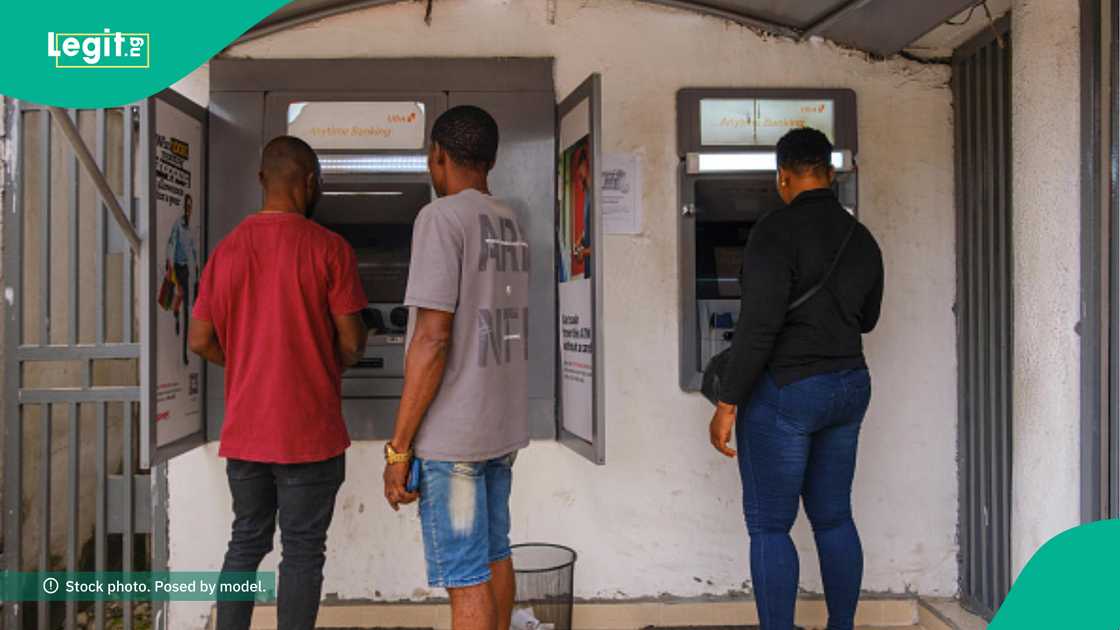Scarcity of Cash Fuels Fear of Exploitation by PoS Agents as New Withdrawal Charges Are Implemented
- The popularity of Point of Sale (PoS) agents continues to grow as they provide service to those who lack access to banking, particularly in isolated and challenging-to-reach areas
- However, recent implementation of charges by the Central Bank has made these agents hike their charges
- The recent scarcity of cash has also made some Nigerians believe that PoS agents are taking advantage of it to exploit Nigerians
Legit.ng journalist Zainab Iwayemi has 5-year-experience covering the Economy, Technology, and Capital Market.
Using convenient point-of-sale devices, mobile money agents have become a common sight throughout Nigeria, offering vital services to millions of individuals especially in remote locations.

Source: Getty Images
Due to a persistent lack of cash at ATMs following the highly criticised redesign of the national currency, the naira, last year, they have even taken over the streets of major cities.
Chi Etche, a media executive said,
“There are three of them (agents) on my street alone. This means I don’t need to take a bike or cab to reach the nearest bank ATM.”
Possibility of exploitation by PoS agents
While many have benefited from the increased employment prospects, others feel that they are taking advantage of Nigeria's financial situation and making the country's cost of living crisis worse than it has been in decades.
Ibrahim Adamu, a 39-year-old trader said,
“We are now buying back our money from (point-of-sale) PoS agents. The commission they charge is increasing and you can hardly get cash from the machines.
Many Nigerians accused bank officials of diverting cash meant for ATMs to agents for personal gain.
“Some agents exploit cash scarcity by charging excessive fees for cash withdrawals and transactions,” Dozie tsaid.
“However, this practice isn’t inherent to the mobile money system but rather a symptom of broader cash availability issues and inadequate oversight.”
A few agents told AFP they also get their cash to run their businesses from other sources.
“I go to markets to buy cash from traders and bureaux de change. I factor that into the commission I charge customers when they come to withdraw cash from me,” said Ayo Olaoluwa, 34.

Read also
Electronic transfer levy: Ex-banker who relocated lists 6 fees banks reportedly don't charge in UK
AFP's request for comment was not immediately answered by a representative of the powerful Association of Mobile Money and Banking Agents of Nigeria.
Dozie maintained, however, that the "benefits of agent banking" can be maintained while the issues are addressed by appropriate regulation and enforcement.
PoS operators begin new charges
Legit.ng reported that effective Monday, December 2, 2024, point-of-sale operators raised their fees in accordance with the Electronic Transfer Levy (EMTL), which levies a fee of N50 on each N10,000 that customers of Opay, Palmpay, and other fintech platforms receive.
In accordance with the 2020 Finance Act, the EMTL was mandated by the Federal Inland Revenue Service (FIRS) on behalf of the Nigerian government.
The policy was supposed to take effect on September 9, 2024, but because of the outcry from Nigerians, it was postponed.
PAY ATTENTION: Сheck out news that is picked exactly for YOU ➡️ find the “Recommended for you” block on the home page and enjoy!
Source: Legit.ng



